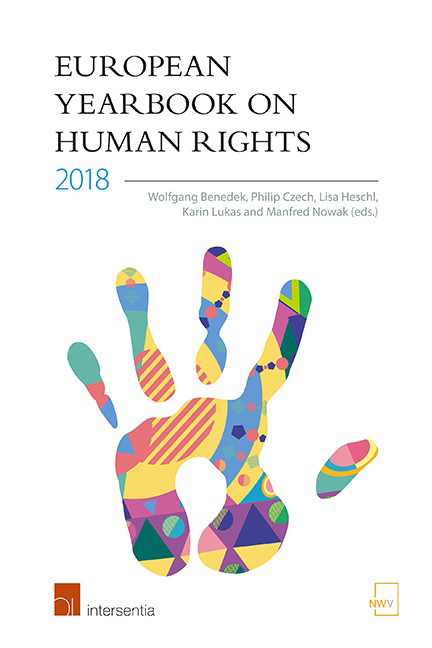Book contents
- Frontmatter
- Scientific Advisory Board
- Editors’ Preface
- Contents
- List of Abbreviations
- List of Contributors
- Part I Topic Of The Year
- Part II Eu
- Part III Coe
- PART IV OSCE
- Enhanced Structure and Geographical Balance: Reforming the OSCE's Human Dimension Meetings
- The Crisis of the International Protection of Human Rights and the Geopolitical OSCE Perspective: ‘The End of Human Rights’, ‘Shooting the Messenger’ or Strengthening Cooperation?
- How Multilateral Organisations can Communicate Better about Human Rights
- Rising Populism and its Impact on Women's Rights: Selected Cases from the OSCE Region
- The Impact of #MeToo on Women's Rights in the OSCE Region
- Part V Others
- Part VI Book Reviews
- Index
Enhanced Structure and Geographical Balance: Reforming the OSCE's Human Dimension Meetings
from PART IV - OSCE
Published online by Cambridge University Press: 31 January 2019
- Frontmatter
- Scientific Advisory Board
- Editors’ Preface
- Contents
- List of Abbreviations
- List of Contributors
- Part I Topic Of The Year
- Part II Eu
- Part III Coe
- PART IV OSCE
- Enhanced Structure and Geographical Balance: Reforming the OSCE's Human Dimension Meetings
- The Crisis of the International Protection of Human Rights and the Geopolitical OSCE Perspective: ‘The End of Human Rights’, ‘Shooting the Messenger’ or Strengthening Cooperation?
- How Multilateral Organisations can Communicate Better about Human Rights
- Rising Populism and its Impact on Women's Rights: Selected Cases from the OSCE Region
- The Impact of #MeToo on Women's Rights in the OSCE Region
- Part V Others
- Part VI Book Reviews
- Index
Summary
ABSTRACT
Competing with other international and regional intergovernmental organisations in the area of fundamental freedoms and human rights, the review mechanism of the Organisation for Security and Co-operation in Europe (OSCE) Human Dimension is currently struggling for to maintain its relevance. The article provides an overview of the reform proposals concerning the review conferences of OSCE Human Dimension and advocates in favour of a comprehensive reform of the OSCE Human Dimension Meetings in order to rebuild trust and efficiency within the OSCE‘s human dimension of security. Different reform proposals presented in the past are analysed, followed by the presentation of a comprehensive reform proposal, suggesting a new ‘ OSCE Human Dimension Implementation Review Mechanism ‘ (IRM).
INTRODUCTION
This article advocates in favour of a comprehensive reform of the OSCE Human Dimension Meetings in order to rebuild trust and efficiency within the OSCE‘s human dimension of security. The work in the OSCE‘s human dimension of security should be more structured, geographically balanced and more innovative in order to fulfil one of its main tasks, which is to identify and recommend areas of concrete political action for the OSCE participating States. Furthermore, the OSCE‘s human dimension of security should be of enhanced operational relevance for the political-military and the economic-environmental dimensions.
First, an overview of the review meetings of OSCE Human Dimension in the context of the OSCE‘s comprehensive security concept will be provided, followed by an outline of the urgent need for reform of these meetings. Furthermore, different reform proposals presented in the past will be analysed, to be followed by the presentation of a comprehensive reform proposal, introducing a new IRM.
THE OSCE HUMAN DIMENSION AND ITS REVIEW MEETINGS IN THE CONTEXT OF THE OSCE ‘ S COMPREHENSIVE SECURITY CONCEPT
Since the adoption of the Helsinki Final Act in 1975, politically binding commitments in the field of human rights and fundamental freedoms as well as the regular review of their implementation by the participating States play a crucial role within the OSCE.
- Type
- Chapter
- Information
- European Yearbook on Human Rights 2018 , pp. 467 - 480Publisher: IntersentiaPrint publication year: 2018

